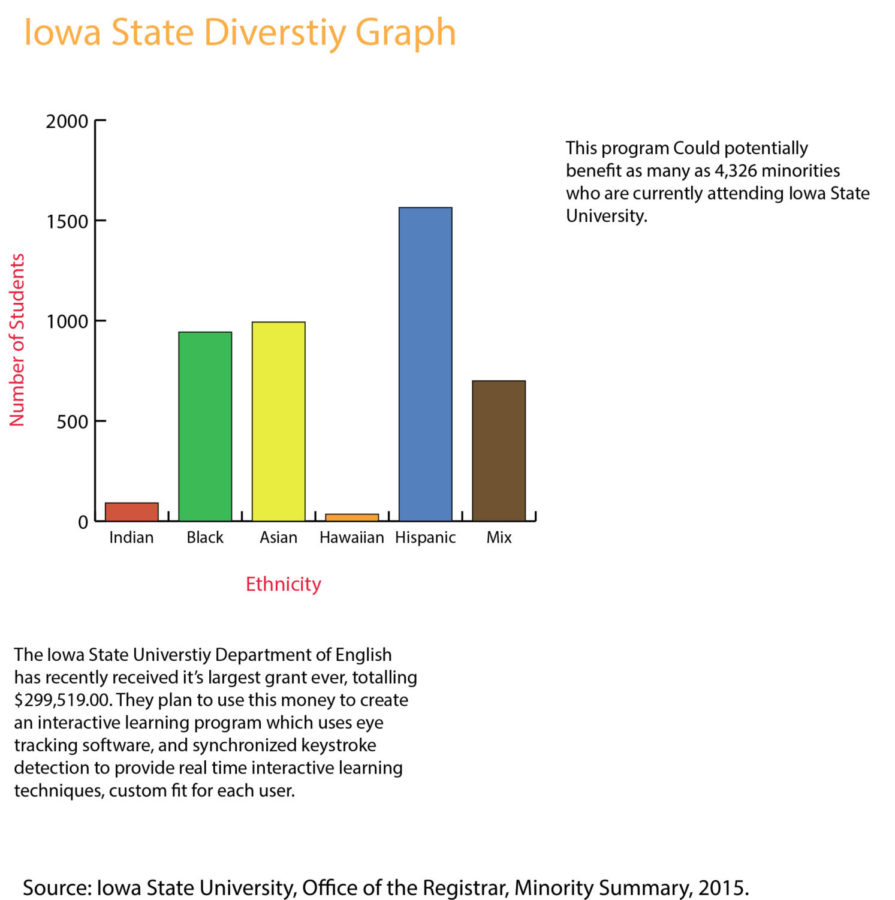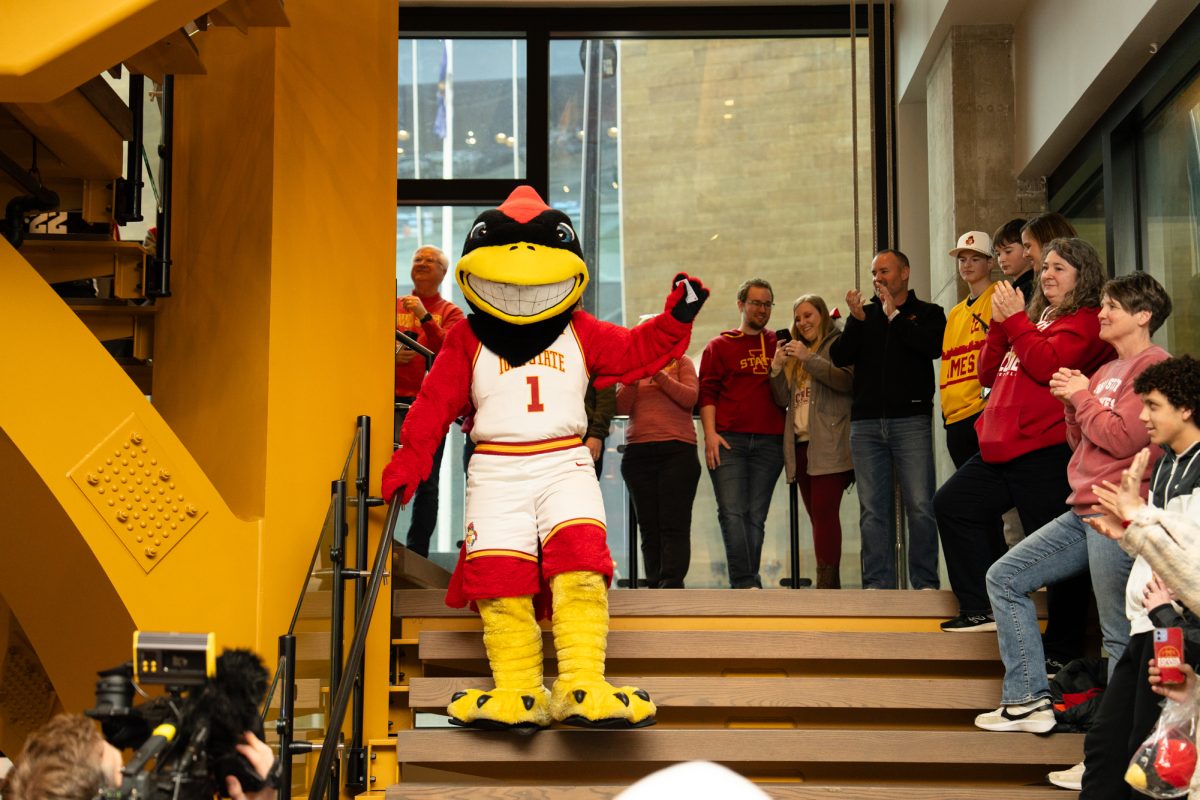New ISU software helps students learn english
The breakdown of diversity of Iowa State University.
October 12, 2015
A new development at Iowa State aims to provide international students with the tools necessary to learn what can be most intimidating about starting a new life in America — the English language.
The software system, CyWrite, was developed by students and professors for use in English Second Language classrooms as an integrated learning program, used by international students to receive instant feedback on their writings in real time.
“We’ve attacked the problem of evaluating student writing from a different angle,” said Miles Conlan, senior in linguistics and second-year research assistant of rule-based natural language processing for CyWrite. “We try to be a teacher [of English] rather than a grader.”
CyWrite was created almost two years ago from nearly $300,000 in funds provided by the College of Liberal Arts and Sciences.
It’s a combination of four essential components: the automated writing evaluation system, web-based text editor, data management system and real-time application programming interfaces. When brought together, the system looks like a word processor similar to Microsoft Word, but allows for fast and accurate computational feedback.
“We did research on a software called Criterion made by a company called Educational Testing Service. It’s a program that helps students write better by providing feedback on essays in the classroom,” said Evgeny Chukharev-Hudilainen, assistant professor of English and project leader. ”It didn’t do very well because the feedback it generates is often very accurate but useless, so we decided to create our own system because what we had didn’t do as well as we would have liked.”
Like a teacher assisting a student during writing, CyWrite tracks a student’s writing and looks for any errors in spelling, sentence structure, singular or plural, et cetera.
Once an error has been detected, the system will notify the student with a colored line, which can be clicked on to learn about the mistake and how it can be fixed.
For example, if a student wrote the sentence, “I love to play with these football,” CyWrite would inform the student that these/those cannot be used with a singular noun.
Technologies, such as eye trackers, are in their early stages of becoming integrated with CyWrite.
”They would be used to see what students are looking at, what are they focusing on, when feedback pops up how are they looking at it,” said Volker Hegelheimer, English professor and leader of proposal writing for CyWrite. “Are they then looking back at the sentence and using the feedback they just looked at?”
What separates CyWrite from its competitors is its reliance on meaningful help created by the people who understand linguistics.
“The whole thing is called computational linguistics and most computational linguistic programs tend to swing more toward the computer side and just sprinkle on linguistics,” Conlan said. “We’re the opposite, as we take linguistics rules, implement them and then add computers.”
Conlan said the team has several students working on simple rules of English, such as prepositions and adding them using code. By focusing on linguistics first, CyWrite is able to effectively pinpoint the problems in students’ writing and provide meaningful help with pop-up windows instead of a simple correction marker.
Chukharev-Hudilainen believes the real takeaway result is the use of undergraduate students to run portions of the program.
CyWrite has hired nine undergraduate students to work in the different fields CyWrite offers.
“We are fortunate because we have great students at LAS and ISU. In general, typically, people don’t trust undergraduate students with difficult jobs because they believe they lack training or experience,” Chukharev-Hudilainen said. “But I love working with undergraduates. A lot of my colleagues don’t even know they exist.”
Hui-Hsien Feng, graduate student in English and graduate project manager, believes it’s a student’s passion for a subject or team that leads him or her to want to become involved.
”We usually get students because they are interested in the product, then when we offer them a job they feel like it’s something they can do,” Feng said. “They can apply what they’ve learned in their classes and put it toward their job.”
Brody Dingel, junior in world languages and cultures and research assistant for CyWrite’s corpus annotation, views the undergraduate hiring rate as an opportunity for students who share the team’s interest.
“It’s new and it’s from Iowa State,” Dingel said. “It’s ours and it’s a good opportunity for us undergraduate students to get involved in the program along with the professors and graduates. This allows us to get experience and get right into the real world of linguistics.
CyWrite is not 100 percent complete but it is polished enough to be considered a workable classroom tool.
“The college originally funded us to create an alpha, and I’d like to say we failed because our current system performs better than the commercial ones already,” Chukharev-Hudilainen said. ”After a year, all instructors within English as second language courses decided to use our product even though it was an alpha because it was better. They didn’t extend their subscriptions to the commercial systems and came to us.”
Despite the immediate success, the program has proved to be difficult to manage in its current form. Chukharev-Hudilainen said it is unusual for a software business to be helmed inside an English department instead of an actual software company.
Not expecting the positive feedback to occur so quickly, the team had to create its own help desk and support crew to assist students and faculty, creating what was originally a small linguistics project into a full-time small software company.
“Say we wanted to add a new feature into CyWrite, we’d have to bring the entire system down to add on, but we can’t do that at the moment because everyone is using it,” Chukharev-Hudilainen said. ”People’s expectations are now higher than we originally intended […] on one hand, it’s great that our system is being used […] but on the other hand, we are not prepared.”
Although CyWrite is an ISU created product and stems from the classrooms at the university, outside interest of the product is growing. The success has even been recognized internationally.
“We are getting requests from all over the world to use the system — there were universities in Norway, England, Russia and the U.S.,” Chukharev-Hudilainen said.







